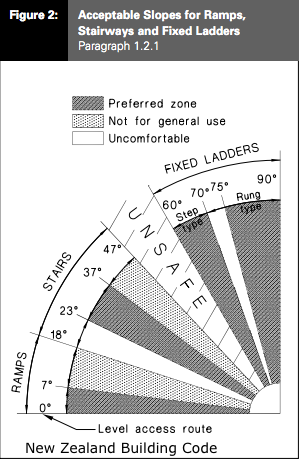Under Construction 
Contents: Materials (Cost, Durability, ...) | Slope
Materials:
Stone: (Road Stone)
Cost: $1-4/sq ft.
Durability: Lifetime with maintenance
Pros/Cons:
More maintenance - grading, erosion
Weeds
Kids can throw rocks onto your lawn at your house
Gravel may be better than a solid surface win an ice storm. It will poke thru ice (assuming you have enough slope so it doesn't build up too thick).
Not as good in snow. Shoveling, snow blowers and trucks with blades will pick up rocks.
Gravel smaller than 3/4" may wash away on a steep slope.
Gravel smaller than 3/4" may get stuck in the tread of tires.
Tips:
They should always be applied on a good solid gravel base and never exceed 2"- 4" in depth.
For a first-time gravel spreading, you need considerably more gravel, as you should cover the prepared driveway with at least 3 to 4 inches of gravel.
Base rock is rock of a given size and everything else smaller than that down to dust-size particles. Base rock is about as close as most mortal beings will ever get to having concrete. Once applied and packed down, it tends to hold it's shape and sheds water. This last property is invaluable to your purposes.
The sharp edges of road stone (sometimes called 47 gravel) hold it together better than river rock which moves around more causing potholes.
Gravel:
Cost: $0.50-3/sq ft.
Durability: Lifetime with maintenance
Pros/Cons:
More maintenance - grading, erosion
Weeds
Kids can throw rocks onto your lawn at your house
Tips:
The best gravel to leave exposed for a long time is R.A.P. (recycled asphalt product), a great product on any driveway. It cost less because it is a recycled blend of crushed asphalt, crushed concrete and crushed brick.
"crusher run" (total unscreened product of a stone crusher)
hardpacks into a good stable surface with most of the larger gravel staying on the road surface rather than flying off to the sides.
Asphalt:
Cost: $1-6/sq ft.
Durability: 10-30yrs.
Pros/Cons:
Cobble stone, pavers & brick
Cost: $10-60/sq ft.
Durability: lifetime
Pros/Cons:
semi-annual washing & sealing, weed control yearly
Tips:
Sealers offer three advantages: they help resist stains, enhance the color, and bind the sand in the joints to make it difficult for weeds to germinate. Sealers, however, are topical products and must be reapplied regularly (generally every 3-5 years). Only water-based sealers can be used in NJ and NYC.
Concrete:
Cost: $3-12/sq ft.
Durability: 30-50yrs.
Pros/Cons:
General Guidelines:
Slope or Grade::
Minimum slope for drainage:
Walkways and Patios:
Slope and Grade are important to ensure proper run-off. It is best to plan at least a 1/4" per foot drop (3/16" if the surface is smooth like concrete), but try not to exceed 1/2 - 5/8" per foot if you want it to appear level.
Maximum slope for safety:
Accessibility (wheelchair) maximum is 8.33% (1 inch/foot)
Grades greater than 5 percent require handrails and level landings at least 5 feet wide.
Chapter 4 - Sidewalk Design Guidelines and Existing Practices - Federal Highway Administration (FHWA)
also National Association of City Transportation Officials
According to the Missouri Department of Engineering Policy Guide, long paths should not rise more than one-half inch per foot. If the slope is too steep, a curved path or path that follows the hill diagonally with switchbacks can be used. For distances of less than 30 feet, the path can rise at a maximum slope of 2 inches per foot (17%) if it levels out after that.
How to Make a Flagstone Path on a Sloping Yard | Home Guides | SF Gate
Compliance Document for New Zealand Building Code - Access Routes

Universal Trail Assessment Process (UTAP)
Links:
Driveway Installation and Maintenance Tips
See also:
Pathways for design and construction ideas.
last updated 20 Nov 2018
|  Home & Garden
Home & Garden
 Driveways and Walkways
Contact
Driveways and Walkways
Contact

